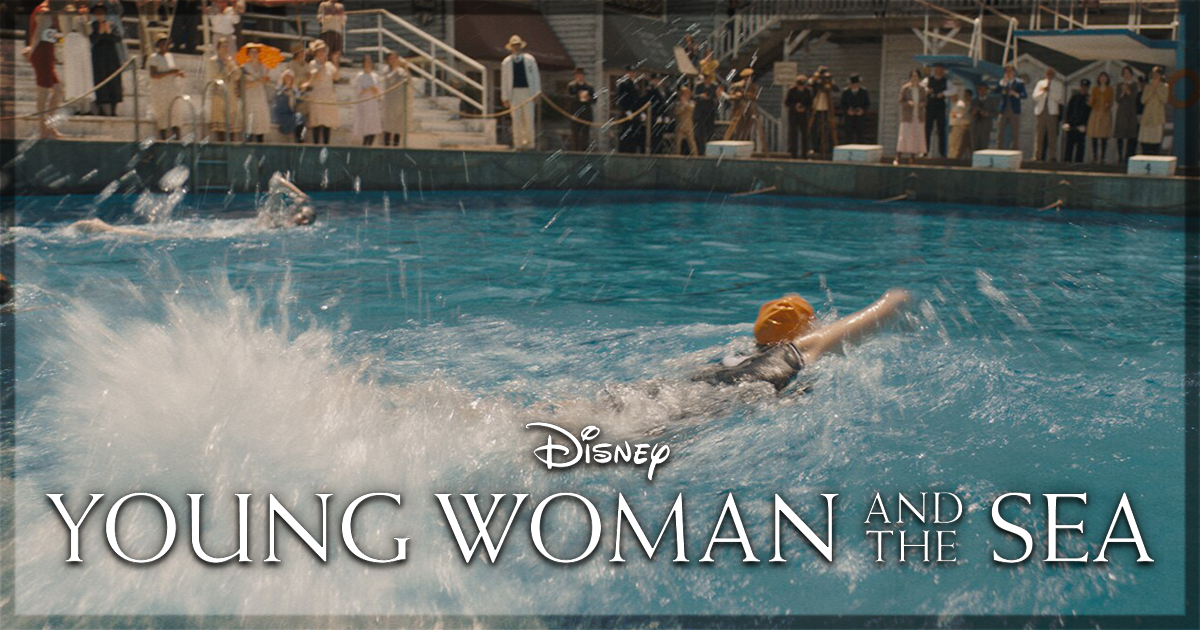Disney’s newest sports-inspiration film, Young Woman and the Sea, may not be the most artistic film ever made, but it knows what it’s supposed to be doing and does it well. Directed by Joachim Rønning, the biopic follows Trudy Ederle (Daisy Ridley), a New Yorker born in 1905, as she develops her love for swimming and attempts to swim across the English Channel. After a childhood bout with measles, Ederle was left weak and with the possibility of hearing impairments. Ederle and her sister joined a women’s swim team in New York City, but because of her poor swimming ability, Trudy is stuck shoveling coal for the team – a necessity for the team to maintain their pool.
Trudy Ederle gets the inspirational sports biopic treatment
In her free time, Trudy trained and became a core member of the team, surprising her coach, her team, and herself with her race wins. Quickly becoming a name in the swimming world, Ederle began to break records and win what tournaments were around for women swimmers in the early 20th century. Strangely, Ederle’s performance at the 1924 Olympics was viewed as a failure in the film – something it clearly wasn’t in real life. Certainly, Ederle, a many-time world record holder, should have won individual Gold Medals, but her two Bronze Medals are nothing to scoff at. In fact, in a film this blunt, the added nuance of Ederle’s three medals being overshadowed would have been far preferable to the movie’s tacit claim that Ederle’s performance was substandard.
Rather than saying her three medals were a failure, Young Woman and the Sea should have said her three medals were a huge achievement that was seen as a failure – particularly because American swimmer Johnny Weissmuller (played in the film by Robert Eades) came home with four medals, three of which were golds. Trudy’s performance at the Olympics could have been framed as another place where misogyny hid her true successes, but instead, the film falsely claims that she didn’t do well at the Olympics.
Crossing the channel with Young Woman and the Sea
The biggest part of the movie follows Ederle as she preps and attempts to swim across the English Channel, a feat that had only been accomplished by a select group of elite male swimmers at the time.
Notice, I didn’t say the film showed her training to cross the channel, a moment that was unfortunately lacking. A Rocky-esque training montage would have solidified the idea that Ederle worked toward her goal, not that she was naturally able to swim the English Channel, the claim the film is approaching. For a movie looking to inspire and push its viewers to follow Ederle’s footsteps, the film rarely shows Ederle training, instead opting to have her interact with family or fight with the systems around her.
Let down by an evil coach who poisons her during her first attempt to cross the channel, Ederle fails her first attempt to swim the channel. She tries again just a few days later but with a new coach and her family there to help root her through it. With copious tribulations along the way, Ederle makes it across the channel – following the pretty standard progression for a film of this nature.
Young Woman and the Sea plays by the book
The film is pretty simple and blunt, but it works. Each scene has a single clear interest, and virtually every scene has only one role, one interest, one goal. It lacks nuance and follows the formula for this style of movie by the letter – would it surprise you to hear Jerry Bruckheimer was a producer on this?
However, the film is highlighted by Amelia Warner’s captivating score. The score is classic, sounding reminiscent of Hans Zimmer and John Williams. Each moment in the film borders on cheesy, but the score imbues a sense of sincerity into each scene. It is moving and poignant. Every single scene has the right amount of score and the right kind of score. Paired with this score is Daisy Ridley’s excellent physical performance. Her emotions aren’t terribly deep in the film, but it doesn’t matter because of the score and how the film knows it’s going to play out. The film is aware that the characters’ emotions aren’t the biggest deal in the film; if you’re going to cry at anything, it will be tears of happiness when Ederle crosses the channel.
Bruckheimer’s classic schtick is in this film. The Remember the Titans style of sports is on full display on screen. The film follows the playbook step by step and while it does so thoroughly, it doesn’t add anything to the pile outside of a milquetoast feminist tone.
Bland feminism doesn’t do anything
Much of the conflict in the film stems from structural inequities that Ederle has to fight past. Whether it be her father’s insistence that she must be married and through his arrangement – which eventually doesn’t happen – or her coaches not letting her train on the boat to France for the Olympics, the film effectively claims that Ederle’s life is just her fighting against the structure around her. None of this criticism is to say that her life wasn’t made harder by the structures around her, but the question that needs to be asked is whether the film’s framing complicates and furthers existing analyses of misogyny and sexism. The film clearly doesn’t, and because of this, it feels like the film’s goal is just saying “You can do it!” This message makes sense in the context of the film’s inspirational hopes, but again I want more.
The film does interesting things with family, having the Ederle matriarch (Tilda Cobham Hervey) make many of the decisions that lead to Trudy’s success. Yet, the film dawdles along too focused on the formulaic approach to give the viewer anything near the necessary attention to family this story deserves. Young Woman and the Sea is inspiring and captivating, but it doesn’t interact with much of the conflict it brings up, leaving the critical viewer out to dry.
Young Woman and the Sea is playing in limited theaters.
Learn more about Young Woman and the Sea on Disney’s website for the title.


